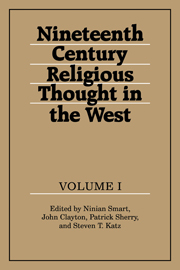1 - IMMANUEL KANT
Published online by Cambridge University Press: 05 August 2016
Summary
Kant wrote extensively on the subject of religion. Although a child of the Age of Enlightenment and as such suspicious of, if not hostile to, all religious orthodoxies, he could not leave religion alone, whether ‘within the bounds of reason’ or even beyond it, touching on (if not actually dealing with) the Christian revelation. His three Critiques all end with religious questions, and one work – Religion Within the Bounds of Reason Only – deals with nothing else.
Despite an air of deceptive obviousness, the religious issues in question, as dealt with by Kant, almost all raise complex questions for the interpreter. Among these are the relation between ritual and morality, between political and religious authority, and – most obscure but surely also most important – the room, if any, left by ‘reason only’ for the Christian revelation.
However, one problem in Kant's philosophy of religion surpasses all others in significance. In Kant's view, morality is the highest sphere of rationally accessible truth. It also must be autonomous, i.e., unlimited in scope and authority by a sphere beyond it. Despite all this he asserts the necessity of a ‘transition’ from ‘morality’ to ‘religion’. Kant must explain and justify the necessity of this ‘transition’. In case he fails, his philosophy of religion fails as a whole. His ‘moral religion’ – as well as any other form of supposedly justified religion – reduces itself, in that case, to morality pure and simple. As for religion – all religion as such and in principle – it is, in that case, at best useful humbug. Such, however, was not Kant's view.
- Type
- Chapter
- Information
- Nineteenth-Century Religious Thought in the West , pp. 17 - 40Publisher: Cambridge University PressPrint publication year: 1985
- 1
- Cited by



